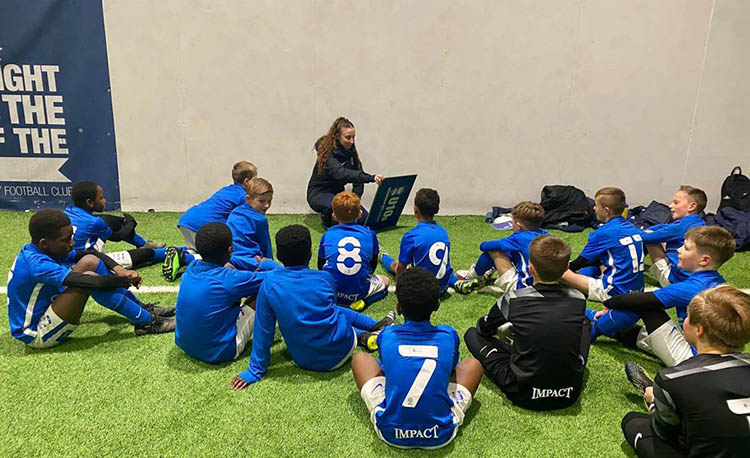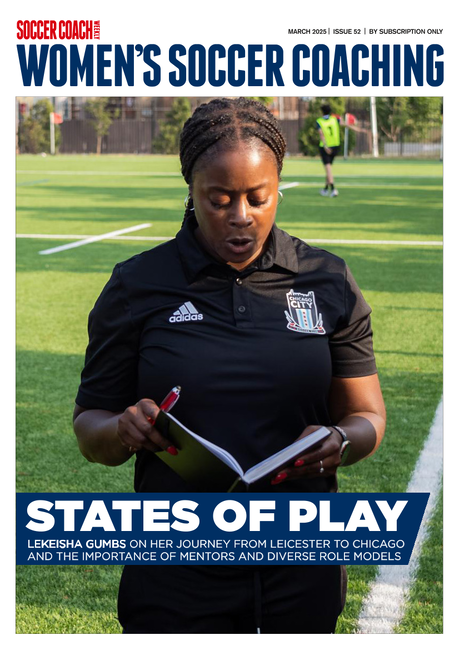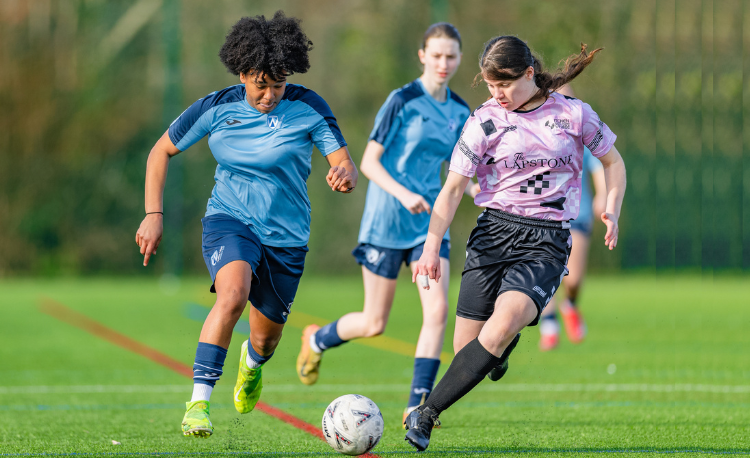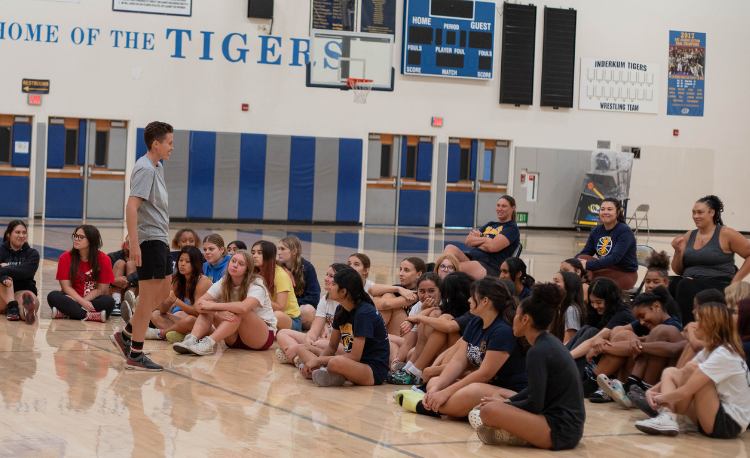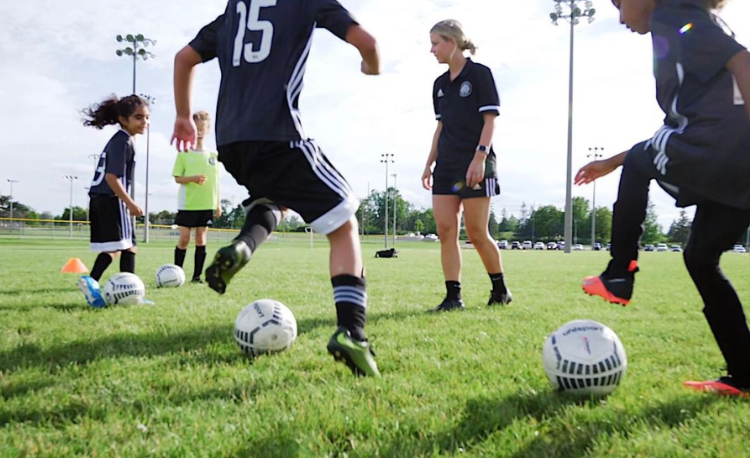You are viewing
1 of your 3 free articles
You have to have no fear and a thick skin'
Birmingham City academy coach GEORGIE VAN DIJK on what she has learned from a career coaching boys and men - and her tips for women hoping to do it
I started coaching boys at the age of 13. At that point I was the only female coach at the club - ’the girl who coached the boys’, as I became known.
In the years since then, I have coached within community, higher education and academy soccer environments.
Gaining that experience within different settings, through years of volunteering and multiple internships, has challenged and benefited me in endless ways.
Coaching alongside men from my early teenage years has encouraged me to become a confident individual, an asset I use to my advantage every day. Being a coach to young men and boys has also enhanced my natural leadership skills.
The biggest challenge I have faced during this time is changing people’s views and perceptions.
I won’t be able to get everyone to be more open-minded or to think differently, but I know I can definitely positively impact a group of players.
Since I have always coached within the male game, I often forget it is not the norm and am confused why people are shocked when they find out what I do.
"Changing people’s views and perceptions is a very difficult thing to do..."
The first question I am always asked is ’Do they listen to you?’ - and my response is always the same, ’Yes of course they do, I’m their coach’.
Of course, there is always going to be at least one person who doubts your abilities. But as long as my players trust and respect me, I am happy.
I could list endless barriers and challenges I have faced since I started coaching within the male game but, personally, I try to see them more as preparation for the future.
Although it would be great to believe this future is going to be easier, I know the demands and pressures individuals face coaching at the elite level.
I have always had clear ambitions within the male game and there isn’t a barrier or challenge I have faced yet that I have allowed to negatively affect me.
Changing people’s views and perceptions is a very difficult thing to do and the approach is very important.
I am a strong believer in using my voice and I know how important it is to do this to encourage change within the game.
In the past I have used confidence, humour and questions to encourage people to think differently about their views and perceptions. This tactic has definitely worked and made people think.
However, different situations require a different approach and I tend to choose my battles wisely.
I have always been very aware of the challenges in front of me, which is why I have sacrificed a lot to better myself through gaining experience and qualifications within the boys and men’s game.
I tackle every barrier and challenge in the same way - with confidence. I not only need confidence in my own abilities, I also need confidence to lead a team of individuals.
My first piece of advice for those wanting to coach in the male game is you have to have no fear. Any challenge or decision is going to contribute to you gaining a greater understanding of the game, so try to enjoy it.
Coaching in the male game is what I have always done and is all I know, so it is very easy for me to say ‘be confident’ and ‘have no fear’. But, in all honesty, it can be tough and you do have to have thick skin if you want to survive.
My second piece of advice - and this is something I have followed consistently - is to invest in yourself.
If you have aspirations to coach within the male game you must invest in your learning. Qualifications are very important but the value of on the grass experience is unmatched.
The biggest benefit of working in the male game is that the impact you’re having is much bigger than football.
People have a lot to learn, but also a lot to unlearn. One person could see you leading a young group of men and it could completely change their views.
When my coaching journey began at 13, I was innocently unaware of the impact I was having on promoting diversity as a young girl within the male game.
I strongly believe this innocence helped progress and overcome the challenges I faced without doubt or hesitation.
It is now clear to me how influential my role is and it is highly important to me to inspire the next generation of coaches. I have also become increasingly aware that my presence alone within the male game challenges perceptions.
From coaching within academy and higher education football settings, my presence is starting to be accepted as the norm, which I believe is a step in the right direction.
Although for the majority of my career I have been unaware of the social impact I was having, I now know that I must utilise my position in the game to promote positive change and excellence.
However, it is clear that challenging perceptions is just one step and we should want to do more to progress inclusion, diversity and coaching in professional football.
6 FEMALE COACHES WHO BLAZED A TRAIL IN THE MEN’S GAME
CAROLINA MORACE - First in the world
In 1999, legendary former Italy striker Morace became the first woman to lead a men’s professional team, taking the reins at Italian third-tier club Viterbese. However, her ground-breaking spell in charge lasted just two games - one win and one defeat - before she resigned, citing interference from club president Luciano Gaucci.
She has since forged a career as a head coach in the women’s game, with the Italy, Canada and Trinidad & Tobago national teams, and Italian clubs Milan and Lazio.
CHAN YUEN TING - First top-flight boss
The honour of being the first female head coach in a top-flight men’s division fell to Chan, who, in December 2015, took charge of Eastern Sports Club in Hong Kong.
She was also the youngest manager in the league, at just 27 - but achieved success by leading them to the title in her first few months at the helm. That took them into the AFC Champions League, with Chan also the first woman to manage a men’s team at the continental level.
SHELLEY KERR - First in the UK
After a short spell in England as head coach of Arsenal Women, Kerr returned to her native Scotland in 2014 to take charge of Stirling University, in the fifth tier of Scottish men’s football. In doing so, she became the first female coach to lead a senior men’s team in the UK.
Kerr led the team to sixth, third and fourth in her three seasons in charge, before leaving to become head coach of the Scotland Women’s national team.
PATRIZIA PANICO - First national team coach
Italy’s joint-leading scorer of all time was entrusted with its next generation of male talent when she was named U15s manager in 2018 - the first woman in the history of the game to be placed in charge of a men’s national team at any level.
Previously, she had become the first female to lead a national team in a game when, as assistant coach of the Under-16s, she stood in for one match due to the absence through illness of head coach Daniele Zoratto.
CORRINE DIACRE - First in Europe’s top tiers
In 2014, Ligue 2 side Clermont Foot appointed Helena Costa as the first female head coach of a French men’s team. However, she quit before taking charge of a game, blaming a "lack of respect" and "total amateurism" from the club’s hierarchy.
Clermont replaced her with Diacre, who spent three years at the helm. On August 4, 2014 - her 40th birthday - Diacre become the first woman to manage in a men’s match in Europe’s top two divisions, as Clermont lost 2-1 to Brest.
KIM WYANT - First to coach in men’s NCAA
In 1985, Wyant played in goal in the US women’s national team’s inaugural match against Italy. She broke further ground in 2015 by taking charge of New York University’s men’s soccer program, having been assistant coach of the women’s team.
In 2018, she became the first female coach to lead a men’s soccer program into the NCAA tournament, ending NYU’s eight-year absence from post-season play.
Related Files
Newsletter Sign Up
Newsletter Sign Up
Discover the simple way to become a more effective, more successful soccer coach
In a recent survey 89% of subscribers said Women's Soccer Coaching makes them more confident, 91% said Women's Soccer Coaching makes them a more effective coach and 93% said Women's Soccer Coaching makes them more inspired.
*includes 3 coaching manuals
Get Inspired
All the latest techniques and approaches
Women's Soccer Coaching offers proven and easy to use soccer drills, coaching sessions, practice plans, small-sided games, warm-ups, training tips and advice.
We've been at the cutting edge of soccer coaching since we launched Soccer Coach Weekly in 2007, creating resources for the grassroots youth coach, following best practice from around the world and insights from the professional game.
